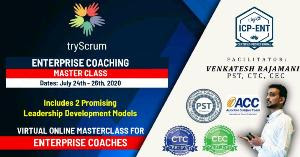Written in 2001 the Agile
Manifesto states that in-person interactions are the most effective way to
facilitate communication. As technologies and connectivity have evolved, so has
the ability for teams to work in different ways. Successful organizations are
embracing these new ways of working and reaping tremendous benefits as a
result.
Since 2001 it’s become more and
more common for team members to be geographically dispersed to the extent that
throughout 2020 most teams have been working remote. We have found that not all
remote teams perform at the same level; in addition it’s clear there are teams
that are working even better remote while others are struggling to cope. With
the recent pandemic, it has forced a new way of thinking and working making it
critical that agile teams not only survive but thrive during this workplace
transition.
Check out this webinar to learn
about the practices, tools, and values at
agile coach certification online
that have allowed many agile teams to thrive while working remotely and the
steps that your organization can take if you have teams or individuals who are
struggling.
We’ll
discuss:
• What great can look like
• Signs that a team or team
member may be struggling
• The role tools play in helping
organizations navigate and stay productive
• Steps your organization can
take to boost engagement and build positive culture
Speakers
Eric
Naiburg - VP of Marketing and Operations, Scrum.org
Eric is co-author of UML for
Database Design and UML for Mere Mortals. Eric is responsible for all aspects
of marketing, support, outbound communications, Professional Scrum Trainer
programs, partners and operations for Scrum.org. Eric was program director at
IBM and Rational Software where he was originally hired in 1999 by original
Scrum Team member John Scumniotales for who he worked for several years and
worked closely with another original Scrum Team member Jeff McKenna sitting in
the next desk. At IBM and Rational Eric was responsible for application
lifecycle management (ALM), DevOps, Data Governance and Agile solutions.
Danny
Presten - Chief Methodologist, Digital.ai
Danny has several transformation
tours of duty behind him in which he's worked in agile organizations, consulted
with senior leaders and led training initiatives. He is an entrepreneurial self
starter with over 20 years experience successfully addressing complex delivery
challenges in a variety of industries including web development, e-commerce,
healthcare, non profit, supply chain, and legal.
Derek
Holt - General Manager, Agile & DevOps, Digital.ai
As General Manager of Agile and
DevOps at Digital.ai, Derek brings nearly 20 years of experience leading large
enterprise and startup technology companies with a consistent focus on the
digital transformation. Derek joined Digital.ai after serving as President
& COO of K4Connect, a venture backed IoT software company focused on
bringing digital solutions to empower older adults and individuals living with
disabilities. He received a BS in Computer Engineering from The Pennsylvania
State University and an MBA from Duke University’s Fuqua School of Business,
where he was named a Fuqua Scholar.
Resource: https://www.scrum.org/resources/accelerating-positive-culture-and-engagement-distributed-teams














